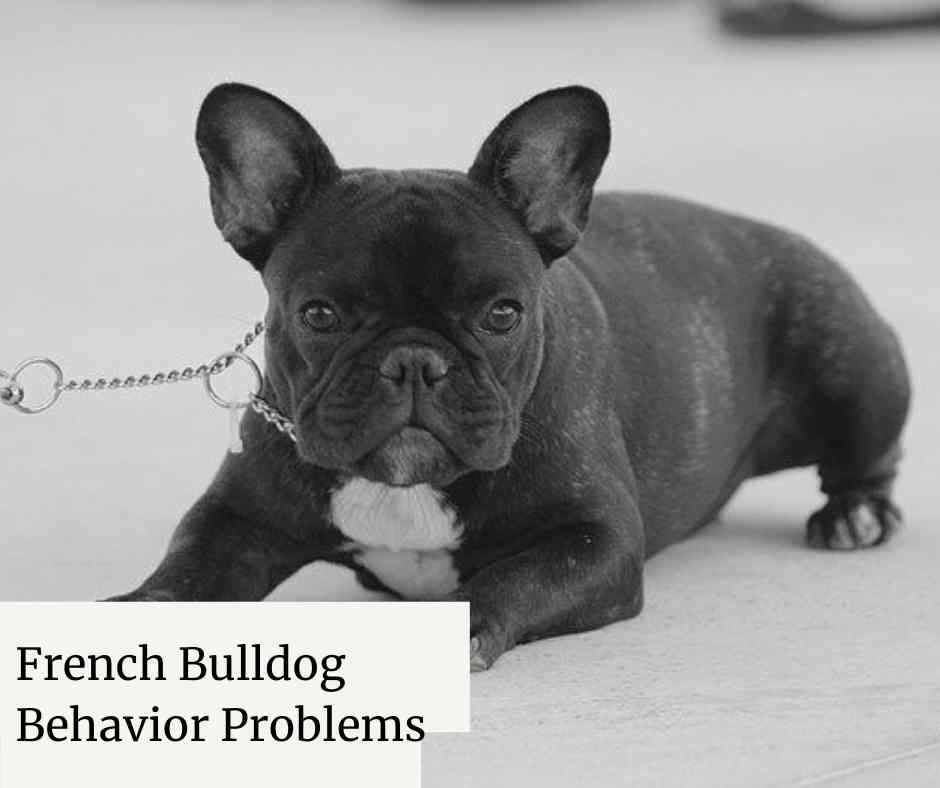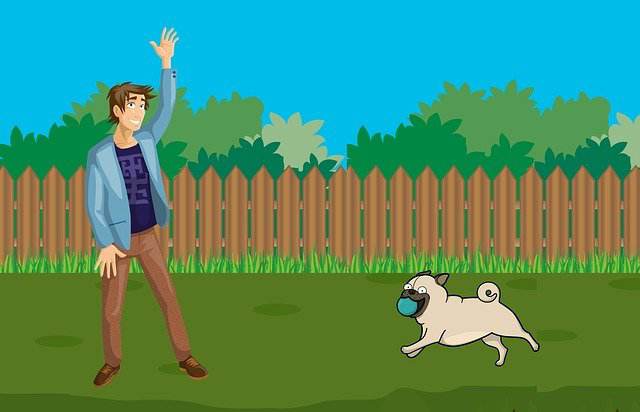10 Common French Bulldog Behavior Problems

Do you have a French Bulldog and are struggling with their behavior? Don’t worry, you’re not alone!
French Bulldogs are a beloved breed, but they can have behavior problems just like any other dog.
In this blog post, we will explore some common French Bulldog behavior problems and provide tips on how to address them.
Whether it’s excessive barking, digging, or chewing, we’ve got you covered.
Read on to learn how to help your furry friend become a well-behaved member of the family.
Read more about The Ultimate Guide on How to Care for a French Bulldog
French Bulldog Behavior Problems
Here are some of the most common French Bulldog behavior problems:
1. Separation Anxiety
Due to their reputation as gregarious dogs that may develop strong attachments to their owners, French Bulldogs can experience separation anxiety.
When left alone, they engage in destructive behavior, excessive barking, and home soiling.
It’s crucial to progressively socialize your Frenchie to being alone in order to address this habit.
Short stints at first, then longer ones as you get more comfortable with it.
Consider crate training to provide them with a secure place to stay when you’re not home, along with lots of toys and treats to keep them engaged.
Learn more about how to handle separation anxiety in French bulldogs.
2. Difficult to Housebreak
Housebreaking or house-training is the process of training a domesticated animal that lives with its human owners in a house or other residence to excrete outdoors or in a designated indoor area, rather than to follow its instinctive behavior randomly inside the house.
French Bulldogs can be quite slow to housebreak. Expect four to six months of consistent crate training
French Bulldogs can still make mistakes even after you are done with your potty training.
Here are some tips:
- Do not overfeed your Frenchie.
- Don’t put your French Bulldog on a leash when you are not around.
- Do not crate your French Bulldog when you are not home.
- Provide alternatives to where your Frenchie can do his business.
- Consistently take your French Bulldog to do his business before bed.
- Start potty training the very first day you get your French Bulldog.
- Do not shout or bite your French Bulldog for making mistakes.
- Don’t change your French Bulldog daily routine every day.
- Stick to the same feeding pattern and time.
- Make the toilet very much accessible as you can.
Learn more about How To Potty Train A French Bulldog.
3. Begging for food
Begging is one of the most popular behavior problems of Frenchies, 90% of the time that Frenchies beg it is their owner’s fault.
There is no denying the fact that Frenchies have a good face and bold eyeballs that are difficult to resist when they beg for anything.
But giving them what they want at any time makes them feel it’s cool to always beg, they can embarrass you in front of your friends.
Here are some tips:
- Never give them what they want immediately, they beg. This is telling them that begging is not acceptable.
- Never share what you are eating with them except vet-approved them to eating such.
- Ignore them when they put up that Irresistible look.
- Use a toy to distract them when you notice they are about to beg.
- Walk away
- Feed them when it’s time and don’t change routine.
- Ignore, ignore, and ignore them when they beg until they get to understand that begging is not good behavior.
4. Destructive chewing
French Bulldogs have strong jaws and may chew on furniture or other objects around the house.
This is a behavior problem in all dogs, not just the French Bulldogs, the major causes of French Bulldog destructive behaviors can be attributed to the following;
- Lack of early socialization
- Loneliness
- Boredom
- Depression
- Traumatic experience
- Abuse
- Illness
- Play aggression
- Separation anxiety
- Effects of medication
First of all, you need to identify the cause of the destructive behaviors and handle it, always use positive reinforcement to avoid damaging the relationship between you and your French Bulldog.
Some important tips;
- Start training as early as you can.
- Walk your dog
- Get chew toys
- Proper socialization
- Keep valuables away
5. Pulling on the Leash
Strong dogs like French Bulldogs are prone to yanking on the leash while out on walks.
They can learn to walk gently on a leash with consistent leash training utilizing positive reinforcement and a properly fitting harness.
It’s crucial to begin leash training early on and to persevere with your training programs.
Here are some tips:
- Train your French Bulldog to walk on a loose leash by using positive reinforcement techniques such as treats and praise when your dog walks calmly by your side.
- Use a no-pull harness that prevents your dog from putting too much pressure on the leash, making it harder for them to pull.
- When your French Bulldog starts to pull on the leash, stop walking and stand still until your dog returns to your side, then continue walking.
- Be unpredictable in your walking pattern to keep your French Bulldog focused on you, rather than on the environment.
- Use distractions such as treats, toys, or verbal commands to keep your dog’s attention and focus on you while walking.
- Start training in a quiet location, and gradually move to more distracting environments as your French Bulldog learns how to walk on a loose leash.
6. Unnecessary Barking
Barking is just a simple way your French Bulldog expresses his or her feelings or a way of talking to us about something.
French Bulldogs are sometimes talkative for different reasons which include the following;
- Signs of pain
- Strangers around
- Anxiety
- Attention seeking
- Emotional distress
- Play aggression
- Signs of hunger
- Welcoming you back home
- Fear
Here are some tips:
Consistent training using positive reinforcement and redirection techniques can help reduce excessive barking.
Provide plenty of physical and mental stimulation, such as daily walks and interactive toys, to help keep your Frenchie occupied.
It’s also important to identify triggers that may cause excessive barking and work to address them.
Learn more about French Bulldogs’ barking triggers.
7. Jumping up on people
French Bulldogs are prone to play aggression, this is simply not knowing when to play or when not to play, or not knowing that biting hurts.
While you might not mind your dog jumping up on you when you get home from work, strangers might not feel the same way.
Here are some tips:
Keep your hands away from your dog unless the front paws are on the ground.
If their front paws touch the ground, give them praise and caress them immediately.
Your dog will eventually learn that if his front paws don’t touch the ground, he won’t get the love he’s looking for.
Avoid reinforcing jumping behavior by not giving attention when they jump up and reward them with attention and treats when they keep all four paws on the ground.
It’s also important to teach your Frenchie an alternate behavior, such as sitting, to greet people.
8. Food guarding
Some Frenchies may become possessive over their food and exhibit aggressive behavior towards other dogs or people who approach their food bowl.
They are always guarding their food until you step in to correct them.
Here are some tips:
To stop your French Bulldog from being too possessive of his food, you need to be patient and practice it constantly.
Make sure it is only you and your Frenchie without other pets.
Place the bowl of food down only when your Frenchie stops whining and begging.
If his growling, rub your palms on his back and call him using the stop commands.
Make sure your French Bulldog responds to commands before trying to stop him from guarding his food.
You can also establish a regular feeding schedule and feed your dog in a quiet, isolated area.
You can also use positive reinforcement training to teach your dog to associate people approaching their food with positive experiences.
9. Unnecessary Jealousy
French bulldogs were primarily and selectively bred to be companion dogs that stay with their owners all day long.
Frenchies get fired up when they see another dog or pet around their owners or territory, they would want cuddles and may start jumping on their owners.
Here are some tips:
- Avoid rewarding your French Bulldog’s jealous behavior with attention or affection.
- When your French Bulldog remains calm and relaxed around other pets or people, reward them with treats and praise.
- Give your pets equal attention and affection so that no pet feels left out or ignored.
- Socializing your French Bulldog with other dogs and animals is a great way to reduce jealousy.
- Use positive reinforcement techniques like treats, praise, and toys to teach your dog commands like sit, stay, and leave it.
10. Excessive Licking
Excessive licking in French Bulldogs can be a problem if it causes skin irritation or other problems.
Licking too much may be discouraged by offering lots of suitable chew toys and refocusing their interest when they begin to lick.
To rule out any underlying medical conditions, speak with a veterinarian if the licking continues.
Additionally, it’s critical to recognize the triggers that may lead to excessive licking and take steps to address them.
Ways to prevent behavior problems in French Bulldogs
Here are some common ways to prevent behavior problems in French Bulldogs:
- Socialization: Make sure your French Bulldog is well-socialized from a young age. Introduce them to different people, animals, and environments so they become comfortable and confident in different situations.
- Positive reinforcement training: Use positive reinforcement techniques to train your French Bulldog using treats and praise. Avoid punishment-based training methods, which can cause fear and anxiety in dogs.
- Consistent routine: Establish a consistent daily routine for your French Bulldog, including regular feeding, exercise, and playtime. This will help prevent boredom and reduce the likelihood of destructive behavior.
- Mental stimulation: Provide mental stimulation for your French Bulldog, such as puzzle toys and training games. This will help keep their mind active and prevent boredom.
- Exercise: Make sure your French Bulldog gets enough exercise every day, both physical and mental. Lack of exercise can lead to behavior problems such as barking and destructive behavior.
- Avoid reinforcing bad behavior: Don’t inadvertently reinforce bad behavior by giving attention, treats, or affection to your French Bulldog when they are engaging in unwanted behavior.
- Supervision: Supervise your French Bulldog when they are in a new environment or around new people or animals. This will help prevent them from getting into trouble or engaging in unwanted behavior.
- Crate training: Consider crate training your French Bulldog so they have a safe and secure place to relax and sleep. This can also help prevent destructive behavior when you are not able to supervise them.
- Regular veterinary check-ups: Make sure your French Bulldog receives regular veterinary check-ups to monitor their health and behavior. Your veterinarian can also provide advice and resources for preventing behavior problems.
Learn more about leaving French Bulldogs alone for too long.
Related questions
What are some common behavior problems in French Bulldogs?
Some common behavior problems in French Bulldogs include excessive barking, separation anxiety, aggression towards people or other dogs, and destructive behavior when left alone.
How can I prevent my French Bulldog from barking excessively?
To prevent excessive barking, ensure that your French Bulldog is getting enough exercise and mental stimulation, and avoid reinforcing barking behavior with treats or attention.
Additionally, consider training your dog with positive reinforcement techniques to reinforce good behavior.
What can I do to help my French Bulldog with separation anxiety?
To help with separation anxiety, gradually desensitize your French Bulldog to your departure by starting with short periods of alone time and gradually increasing the duration.
Additionally, provide your dog with plenty of mental and physical stimulation, and consider using calming aids such as pheromone sprays or supplements.
How should I handle aggression in my French Bulldog?
It is important to address aggression in French Bulldogs as soon as possible, as it can be dangerous for both the dog and others.
Work with a professional dog trainer to identify and address the underlying causes of the aggression, and avoid any situations that might trigger aggressive behavior.
How can I prevent my French Bulldog from destructive behavior when left alone?
To prevent destructive behavior when left alone, ensure that your French Bulldog is getting enough exercise and mental stimulation, and consider using puzzle toys to keep them occupied.
Additionally, provide a safe and comfortable space for your dog when you are away, such as a crate or a designated room.
Is it possible to train an older French Bulldog with behavior problems?
Yes, it is possible to train older French Bulldogs with behavior problems, but it may require more patience and consistency than training a younger dog.
Work with a professional dog trainer to develop a training plan that addresses your dog’s specific behavior issues and is tailored to their individual needs.
Conclusion
In conclusion, French Bulldogs are adorable and loving pets that can bring joy to any household.
However, like any other breed, they can have behavior problems that need to be addressed.
It’s important to understand their body language and nonverbal communication to prevent any aggressive behavior.
If you’re struggling with your French Bulldog’s behavior, don’t hesitate to seek professional help.






